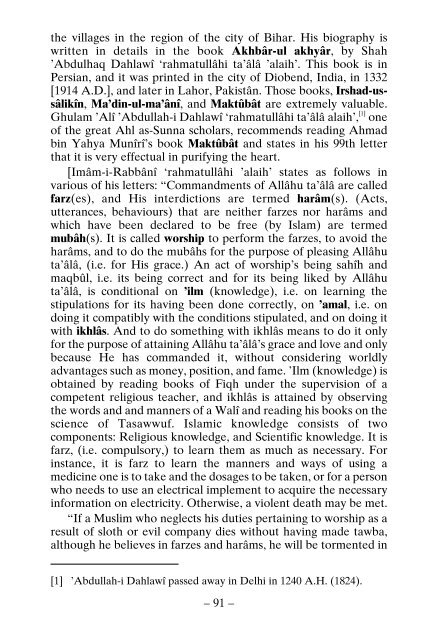Belief and Islam
BELIEF AND ISLAM star This work, Belief and Islam, originally was written in Persian under the title I’tiqâd-nâma by Hadrât Mawlânâ Khâlid al-Baghdâdî, a profound ‘âlim of Islam and a specialist in ma’ârif of tasawwuf. Hâji Faydullah Effendi of Kemah, a khalîfa of great walî Mavlânâ Mahmûd Sâhib, the brother of the author, translated the book into Turkish and named it Farâid-ul-fawâid which was printed in Istanbul in 1312 A.H.[1894]. Our bookstore had it translated again from the Persian original into Turkish and, some explanations and three chapters, published it with the title Imân ve Islâm in 1966. German, French and Arabic versions are also published by our bookstore. This book, explains five fundamentals of Islam, six fundamentals of îmân and the contemporary information about the matter and refutes those who are against Islam and those who are lâ-madbhabî.
BELIEF AND ISLAM
star This work, Belief and Islam, originally was written in Persian under the title I’tiqâd-nâma by Hadrât Mawlânâ Khâlid al-Baghdâdî, a profound ‘âlim of Islam and a specialist in ma’ârif of tasawwuf. Hâji Faydullah Effendi of Kemah, a khalîfa of great walî Mavlânâ Mahmûd Sâhib, the brother of the author, translated the book into Turkish and named it Farâid-ul-fawâid which was printed in Istanbul in 1312 A.H.[1894]. Our bookstore had it translated again from the Persian original into Turkish and, some explanations and three chapters, published it with the title Imân ve Islâm in 1966. German, French and Arabic versions are also published by our bookstore. This book, explains five fundamentals of Islam, six fundamentals of îmân and the contemporary information about the matter and refutes those who are against Islam and those who are lâ-madbhabî.
You also want an ePaper? Increase the reach of your titles
YUMPU automatically turns print PDFs into web optimized ePapers that Google loves.
the villages in the region of the city of Bihar. His biography is<br />
written in details in the book Akhbâr-ul akhyâr, by Shah<br />
’Abdulhaq Dahlawî ‘rahmatullâhi ta’âlâ ’alaih’. This book is in<br />
Persian, <strong>and</strong> it was printed in the city of Diobend, India, in 1332<br />
[1914 A.D.], <strong>and</strong> later in Lahor, Pakistân. Those books, Irshad-ussâlikîn,<br />
Ma’din-ul-ma’ânî, <strong>and</strong> Maktûbât are extremely valuable.<br />
Ghulam ’Alî ’Abdullah-i Dahlawî ‘rahmatullâhi ta’âlâ alaih’, [1] one<br />
of the great Ahl as-Sunna scholars, recommends reading Ahmad<br />
bin Yahya Munîrî’s book Maktûbât <strong>and</strong> states in his 99th letter<br />
that it is very effectual in purifying the heart.<br />
[Imâm-i-Rabbânî ‘rahmatullâhi ’alaih’ states as follows in<br />
various of his letters: “Comm<strong>and</strong>ments of Allâhu ta’âlâ are called<br />
farz(es), <strong>and</strong> His interdictions are termed harâm(s). (Acts,<br />
utterances, behaviours) that are neither farzes nor harâms <strong>and</strong><br />
which have been declared to be free (by <strong>Islam</strong>) are termed<br />
mubâh(s). It is called worship to perform the farzes, to avoid the<br />
harâms, <strong>and</strong> to do the mubâhs for the purpose of pleasing Allâhu<br />
ta’âlâ, (i.e. for His grace.) An act of worship’s being sahîh <strong>and</strong><br />
maqbûl, i.e. its being correct <strong>and</strong> for its being liked by Allâhu<br />
ta’âlâ, is conditional on ’ilm (knowledge), i.e. on learning the<br />
stipulations for its having been done correctly, on ’amal, i.e. on<br />
doing it compatibly with the conditions stipulated, <strong>and</strong> on doing it<br />
with ikhlâs. And to do something with ikhlâs means to do it only<br />
for the purpose of attaining Allâhu ta’âlâ’s grace <strong>and</strong> love <strong>and</strong> only<br />
because He has comm<strong>and</strong>ed it, without considering worldly<br />
advantages such as money, position, <strong>and</strong> fame. ’Ilm (knowledge) is<br />
obtained by reading books of Fiqh under the supervision of a<br />
competent religious teacher, <strong>and</strong> ikhlâs is attained by observing<br />
the words <strong>and</strong> <strong>and</strong> manners of a Walî <strong>and</strong> reading his books on the<br />
science of Tasawwuf. <strong>Islam</strong>ic knowledge consists of two<br />
components: Religious knowledge, <strong>and</strong> Scientific knowledge. It is<br />
farz, (i.e. compulsory,) to learn them as much as necessary. For<br />
instance, it is farz to learn the manners <strong>and</strong> ways of using a<br />
medicine one is to take <strong>and</strong> the dosages to be taken, or for a person<br />
who needs to use an electrical implement to acquire the necessary<br />
information on electricity. Otherwise, a violent death may be met.<br />
“If a Muslim who neglects his duties pertaining to worship as a<br />
result of sloth or evil company dies without having made tawba,<br />
although he believes in farzes <strong>and</strong> harâms, he will be tormented in<br />
[1] ’Abdullah-i Dahlawî passed away in Delhi in 1240 A.H. (1824).<br />
– 91 –

















